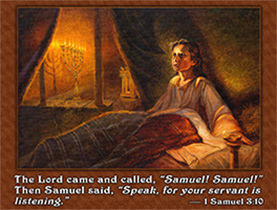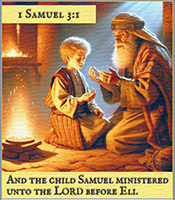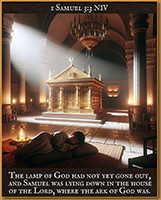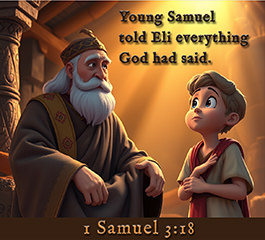1 Samuel 3:1–21 . . . Bible Study Summary with Videos and Questions
“God’s First Revelation to Young Samuel”
Just as God spoke directly to young Samuel, Jesus welcomes children into a close relationship with Him. When we trust in Jesus as our Savior, we can hear and respond to God's voice at any age, just like Samuel did.
This story clearly demonstrates that God communicates with people. While the way He spoke to Samuel might seem unique, the underlying principle is that God desires to have a relationship with us and will find ways to make His will known. This can be through the Holy Spirit, the Bible, prayer, wise counsel, and even unexpected circumstances.
We'll see today in chapter 3 the account of the rise of Samuel to the position of prophet (v. 21), a fact acknowledged and accepted by every Israelite. The Hebrew word used to describe Samuel in v. 1 (naar) refers to a young teenager. As we read this opening passage of chapter 3, we should probably think of Samuel as a boy in his early teens. (Josephus wrote that Samuel was 12 years old.) It seems that several years have passed since chapter 2's end. At this time in Israel's history (i.e., the late Judges Period), special revelations from God were rare, normally coming to prophets in visions or dreams (as in Numbers 12:6; 1 Samuel 28:6). Samuel, who saw clearly, both physically and spiritually, contrasts with Eli, who couldn't see well either way.
Samuel’s Calling (3:1–18)
[Note: Click the link to This Week's Passage near the bottom of this page to read today's Scripture.] The writer of Samuel informs us that, “In those days the word of the Lord was rare; there were not many visions” (v. 1). Men weren't listening to God in those days, and God didn't speak very often. This “silence” is often a form of divine judgment. We 're told that prophecy was rare, so that we see the calling of Samuel as an end to God’s silence (see vv. 19–21).
The lamp of God (v. 3) is an expression that refers to the lamps on the sanctuary lampstand that continued to give light through the night (Exodus 27:20–21). The fact that it (they) had not gone out indicates that God called to Samuel just before dawn. Samuel may have been sleeping in the holy place or the sanctuary courtyard. Eli evidently slept nearby (v. 5). Samuel's self-discipline in getting up three times in response to what he thought was Eli's call is commendable; his selfless, willing obedience qualified him to receive the ministry that God entrusted to him.
In vv. 11–14, God restated for Samuel what the prophet had told Eli concerning the fate of Eli's house in the near and far future (see our summary that highlights vv. 27–36). Under Mosaic Law, the penalty for showing contempt for the priesthood, for disobeying parents, and for blasphemy, was death (Deuteronomy 17:12; 21:18–21; Leviticus 24:11–16, 23). This was what "Hophni" (literally "Tadpole") and "Phinehas" ("Black One") would experience (as shown in next week's summary 1 Sam. 4:1–22). The cutting off of Eli's family line happened approximately 130 years later (1 Kings 2:27, 35).
The details provided for us in vv. 2, 3, and 7 help us understand the setting in which these events took place. Samuel was lying down in his appointed place inside the tabernacle, not that far from the Ark of the Covenant, a.k.a. the Holy of Holies. Eli was sleeping somewhere else, not too far to hear Samuel's calls. As the author informs us, Eli’s eyesight had greatly deteriorated; his vision was seriously impaired. With Eli’s age, weight, and visual limitations, he needed the help of a boy such as Samuel who was able to bring Eli a drink of water or run other errands for him. It was only natural for Samuel to assume that a late-night call had come from his master, Eli.
Remember: From the writer’s statement in v. 3, its clause is rich with meaning, both literal and symbolic. (1) Time of Day: The “lamp of God” refers to the golden lampstand (menorah) in the Tabernacle; (2) Spiritual Darkness and Hope: This period in Israel's history was marked by spiritual decline, a lack of prophetic vision, and corruption within the priesthood (Eli's sons); (3) God's Continued Presence: The burning lamp symbolized God's faithful presence with His people; (4) Transition and New Beginning: The early morning hours, a time of transition from night to day, are symbolically fitting for the beginning of Samuel's prophetic ministry; (5) Samuel's Purity and Readiness: Samuel, a young boy, is depicted as sleeping near the Ark of God, in close proximity to God's presence; (6) In essence, the detail of "The lamp of God had not yet gone out" does more than just tell us the time of day; it paints a picture of a pivotal moment where, despite spiritual dimness, God's light persisted, poised to break through and call a new prophet to lead His people. We know that God's call to Samuel came early in the morning, for he writes: “The lamp of God had not yet gone out.” The lamp is the golden lampstand, having seven lamps that are to “burn continually.” This doesn't mean they are to burn 24 hours a day, but that they're to always burn at night.
For the first two times that Samuel was called by God, the young lad assumed he'd heard his master Eli's voice, which is understandable, especially if Eli sometimes called to Samuel for assistance during the night. It wasn't until the third “call” that Eli finally grasped the situation, realizing that it was God who was calling Samuel so he could reveal his Word to the boy. Following Eli's instructions, Samuel responded directly and knowingly to God when the Lord called the third time.
"Eli" (literally "God is High") realized that God's words to Samuel were very significant, thereby insisting that the lad tell him what God had said. A faithful prophet from the start, Samuel faithfully reported to Eli all that God had revealed to him (v. 18). Ironically, Samuel's first message as a prophet was an announcement of his teacher's doom. (Note: This was the second time Eli had received a prophecy of his family's future [cf. 2:27–36]. Thus he knew that the prediction would surely come to pass; so, in v. 18, we see that he accepted God's will submissively.)
God's announcement to Samuel of what he was about to do to him would certainly cause both ears of those who'd heard such news to tingle. That's no exaggeration. When Eli heard the news, he collapsed, resulting in his death (which is shown in our v. 18 summary). The message given to Samuel focused on Eli’s sin more than on the sins of his sons. More specifically, God indicated that he'd bring about judgment on Eli and his house because Eli knew well of his sons' sins but did nothing to restrain them. In contemporary terms, Eli was an “enabler.” He facilitated his sons’ sinful behavior rather than resisted and opposed it.
Samuel’s Ministry (vv. 19–21)
19The Lord was with Samuel as he grew up, and he let none of Samuel’s words fall to the ground. 20And all Israel from Dan to Beersheba recognized that Samuel was attested as a prophet of the Lord. 21 The Lord continued to appear at Shiloh, and there he revealed himself to Samuel through his word (1 Sam. 3:19–21).
The author next informs us that Samuel's encounter with God, and his resulting reception of God's Word, is the first of many. Verse 21 tells us specifically of at least a second appearance of God to Samuel at Shiloh; the inference is that others will follow. It was at this first appearance of God to Samuel that young Samuel not only seems to have begun to know the Lord but also to have become a prophet. Soon, Samuel will become a priest, then a judge; so keep up with these revealing hearty summaries.
The closing three verses summarize Samuel's continuing ministry as a "prophet" (Hebrew: nabbi') in Israel. In addition, the Hebrew ro'eh for Samuel, which we'll cover in chapter 9, describes the same office as being a "seer." So, when "prophet" appears, it usually emphasizes the proclamation aspect of the individual's ministry, and when "seer" occurs, the emphasis is usually on his or her ability to perceive messages from the Lord. The author reveals that Samuel was a proclaiming prophet and a perceptive seer.
V. 19 begins with "The Lord was with Samuel as he grew up." Is there anything better than knowing that you have the LORD with you? For Christians, we know the value we have in having God with us: If God is for us, who can be against us? (Romans 8:31). God is for us, not because we're so good or great, but because of who we are in Jesus.
The following phrase in v. 19, "let none of his words fall to the ground," means that all of Samuel's prophecies came to pass, and were known to be true words from God. Therefore, all Israel . . . recognized that Samuel had been established as a prophet of the LORD. The "fall to the ground" phrase is a metaphor taken from archery: The arrow that falls to the ground fails to reach its target. In contrast, all of Samuel's words hit their mark. They were effective because God found him to be a reliable "bow" that accurately and reliably delivered his words.
And the often-repeated phrase in v. 20, "from Dan to Beersheba," became proverbial during the united monarchy; it described all the land of Israel: Dan stood on the northern border, about 150 miles from Israel's southernmost major town, Beersheba.
Finally, v. 21 declares that the Word of the Lord came to Samuel. The phrase "The Lord revealed himself to Samuel through his word" is what Samuel the prophet communicated to the people. He did this so consistently that his word amounted to the Lord's Word. It indicates that God's communication with Samuel was not a one-time event, but a continuous and established pattern. This continuous revelation through God's word solidified Samuel's identity and authority as a true prophet of the Lord.
Closing considerations Chapter 3 demonstrates how God rewards faithful obedience to his word by providing additional ministry opportunities (cf. Matthew 25:22–23; 1 Timothy 1:12). Samuel became the source of God's revelations to Israel. He continued to receive revelations from God as he represented God on earth because he remained faithful. Eventually, he became the most powerful man in Israel — even anointing the nation's first two kings. Like Moses, Samuel became an excellent leader of the Israelites. He functioned as judge, priest, and prophet. Yet he glorified the kings whom he appointed — the Lord's anointed — above himself. In many respects he foreshadowed the Lord Jesus Christ.
Chapters 1 through 3 prepare us for the rest of 1 and 2 Samuel, both historically and theologically. They teach us that God responds to the faith of his children, even insignificant people. A barren and therefore despised woman became the mother of Israel's most powerful man because she trusted and obeyed God. This was a complete reversal of what one would naturally expect. The three chapters also document that God blesses with fertility those who commit to his revealed will, but he cuts off the uncommitted.
There are four conflicts and reversals of fortune in these chapters: Peninnah and Hannah (ch. 1); the arrogant and the innocent (2:1–10); Eli's sons and Samuel (2:11–36); and Eli's "line of priests" and Samuel's "line of prophets" (3:1–4:1a). God decides who'll prosper and who'll perish. His judgment is based on his faithfulness to what he's said he'd do when people respond appropriately to his will.
† Summary of 1 Samuel 3:1–21
…by Jan van ’t Hoff at GospelImages

Click to enlarge and download this image of
the Lord calling young Samuel: 1 Samuel 3:10.
In this passage, Samuel serves the Lord under Eli in a time when prophetic revelation is rare in Israel (3:1). One night, God calls out to Samuel, who, not recognizing the Lord’s voice, assumes Eli is calling him. After three occurrences, Eli realizes it is God calling Samuel and instructs him to respond, “Speak, Lord, for your servant is listening” (vv. 2–9). When God calls again, Samuel listens, and the Lord delivers a message of judgment against Eli’s house — declaring that the sins of Eli’s sons and his failure to restrain them will result in their downfall (vv. 10–14).
Though Samuel is afraid to relay this difficult message, Eli insists he share everything. Samuel faithfully tells Eli everything God has revealed, and Eli humbly accepts the Lord’s will (vv. 15–18). As Samuel matures, all Israel recognizes him as a true prophet, for the Lord remains with him and continues to reveal God›is word through Samuel at Shiloh (vv. 19–21). This pivotal chapter marks the transition of spiritual leadership in Israel from Eli to Samuel, establishing Samuel as the Lord’s prophetic spokesman and signaling a renewed era of God’s guidance for his people.
Key points with verse references:
• Samuel ministers to the Lord under Eli during a time when “the word of the Lord was rare” (v. 1).
• God calls Samuel three times before Eli helps him discern the voice — and Samuel responds willingly (vv. 2–9).
• God gives Samuel a message of judgment against Eli’s house for the sins he did not restrain (vv. 10–14).
• Samuel courageously delivers God’s message to Eli, who accepts it as the Lord’s will (vv. 15–18).
• The Lord is with Samuel, confirming him as a prophet to all Israel as God continues to reveal his Word through him (vv. 19–21).
This Week's Passage
1 Samuel 3:1–21
New International Version (NIV) [View it in a different version by clicking here; also listen to chapter 3 narrated by Max McLean.]
† Summary Video: “The First Book of Samuel”
† Watch this introductory video clip created by BibleProject on bibleproject.com.
- Q. 1 What do you make of Eli's physical disability (v. 2 and 2:33)? What might this and "the lamp of the Lord" (v. 3) symbolize?
- Q. 2 What does it mean that Samuel "let none of his words fall to the ground" (v. 19)?





